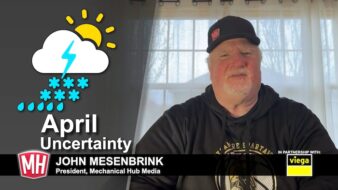Use these tips to keep customers comfortable this winter
Do you know how to ensure your tankless water heater installations perform optimally this winter?
Tankless water heaters — known for their on-demand hot water, low energy use, and compact size — are popular among homeowners. Propane-powered systems offer an additional advantage: they can be installed virtually anywhere.
For customers located in regions that experience snow and frigid temperatures, there are a few considerations for HVAC professionals to keep in mind to ensure their customers’ comfort year-round.
Here are eight tips for specifying, installing, and maintaining tankless systems in cold climates:
- Size the unit for the cold. As temperatures drop, more time and energy are needed to heat water to the desired level. To ensure customers’ tanks meet demand throughout the year, it’s important to know how they’ll perform in cold weather. For example, in Washington D.C., a unit that can produce 8.5 GPM on a hot summer day will only produce 5 to 6 GPM on a cold winter day.
- Design for the coldest conditions. Be aware of how low ground temperatures can go and how much water a household will need. Also consider the difference between the set unit temperature and the ground temperature, also known as the Delta T. The bigger the gap, the lower the unit’s flow rate will be.
- Bring it inside. Many tankless systems have some degree of built-in freeze protection. Check the product specs, and your region’s historical weather patterns, to determine where to install the tank.
- Vent smart. Proper venting is important. Installations should avoid freezing winds and have sufficiently long vent runs. In cold areas, the minimum vent run recommendation is six feet.
- Keep vents clear of snow. Before a snowstorm, remind customers to keep a few feet around the vent clear of snow. Some tankless models offer air intake from the outer pipe — if that’s blocked, the unit may turn itself off.
- Educate customers with recirculators. For customers whose systems have a recirculating loop, remind them to turn off that function when bad weather is on the way. If the vent termination is snowed under, the unit will eventually power off with an error code.
- Consider condensation. Drain condensate from condensing units into a conditioned space to avoid drain freezes, which will cause the unit to turn off.
- Be ready with backup power. Many tankless systems need electricity for freeze protection and ignition. A propane standby generator can help ensure that customers’ hot water will continue to flow, even during a power outage.
For more information about propane tankless water heaters, visit Propane.com/Water-Heating.
 Bryan Cordill is director of residential and commercial business development for the Propane Education & Research Council. He can be reached at bryan.cordill@propane.com.
Bryan Cordill is director of residential and commercial business development for the Propane Education & Research Council. He can be reached at bryan.cordill@propane.com.




Join the conversation: